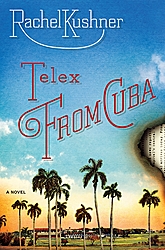
I have mixed feelings about Rachel Kushner's Telex from Cuba. Overall, I was disappointed, but at the same time I was glad I read it. It had the potential to be a truly great book because of the story, but it just fell a little flat. The novel takes place during the 1950s in Cuba, right before the revolution. It was interesting to read about Americans living the good life in Cuba since we can't even visit there today, or at any point during my lifetime. Kushner's mother grew up there, and that explains why at many times it reads more like a memoir than a novel. However, that caused problems because the main character is a boy, and Kushner just doesn't write effectively as a teenage guy. I kept forgetting that the character was supposed to be a guy. That kept pulling me out of the story. It was made worse by the fact that other characters narrate at various points as well, although he's the only who talks in the first person. All the other character sections are in third person. And yet all of their voices sound the same. It was confusing and distracting. I think the entire book should have been written in Everly Lederer's voice in first person and it would have been a lot stronger overall.
I also found it distracting that one of the characters was named Rachel K. She was a rather unlikable exotic dancer and prostitute/mistress to political leaders such as Batista, whom she spied on for the revolutionaries. It was odd that she had the same name and last initial as the author. Perhaps she was so named after a real person, but this bugged me. Other real people, such as Batista, Raul and Fidel Castro, Hemingway, Lucille Ball and Desi Arnaz all make appearances, so that may be the case. That added to it seeming like a memoir.
Here are a few things I really liked from the book. On page 24, a black man attacks the store keeper for the United Fruit Company (where pretty much everyone worked, it's now Chiquita). "That's not politics, it's mental illness." Authors have a tendency to turn scenes like this into political statements, so I was pleasantly surprised by that statement. On page 220, one of the characters writes letters to the U.S. State Department about the rebels, warning them, but no one was interested. The Americans on the island were more concerned with Raul Castro's upcoming wedding. Which was a little odd because they kept describing him as gay, although the dancer says at one point that he only acted that way and wasn't really, whereas Fidel seemed to be covering for something in his overly macho act. I also found it interesting that one of the Americans who joined with the rebels eventually left and became super conservative because of what he had seen and been asked to do, such as bulldoze bodies into graves after mass executions. It also talked about how Castro bringing in Che Guevara as finance minister ruined their financial system immediately. Yet idiots lift up these two evil murderers as heroes. It was refreshing to read a book that did not portray them that way, especially a book that was so well-received critically. Maybe the critics just saw it was about Cuba and didn't actually read it.
Overall, I still feel like it was a worthwhile read, but I just feel like it has a lot more potential than what it achieved. It was a finalist for the National Book Award last year though, so apparently I'm in the minority in being disappointed.
No comments:
Post a Comment